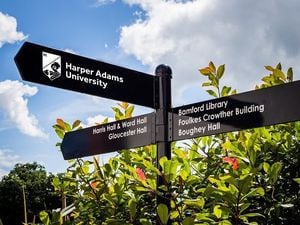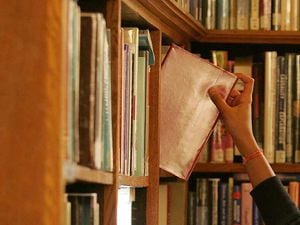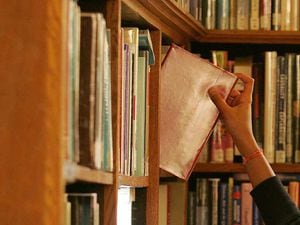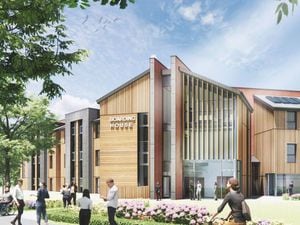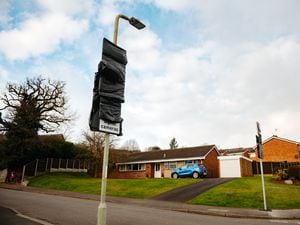Shrewsbury school's science centre is a roaring success - with pictures
Staff, pupils and visitors to the new showpiece science block of a top Shropshire independent school are greeted by the skeleton of a huge bear.
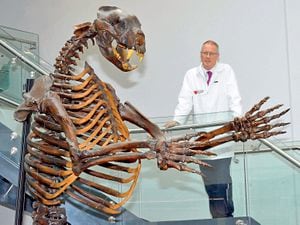
The 10ft beast, which dominates the foyer of the new £11 million centre at Concord College in Acton Burnell, is the brainchild of head of science Barry Brown.
"I wanted something which, when I come in here, makes me think of a museum or a university," says Mr Brown, who joined the school in September last year.
"The students here aspire to go to university, and we are trying to create a university-standard facility here."
The 10ft short-faced bear skeleton, which was imported from the United States, is certainly an eye-catching presence. And the school, based in the grounds of Acton Burnell Castle, is opening up its new science block to primary school pupils from the area to encourage them to take an interest in science.

Every week, a group of youngsters from Longnor CE Primary School in Shrewsbury visit as part of the Crest awards scheme.
"It's a bit like the Duke of Edinburgh awards, but for science," says Mr Brown, who took up his post in September, having previously taught at Shrewsbury High School.
Taking part in one of the sessions is 11-year-old Ben Willis, who has spent the afternoon testing different water samples.
"We have taken water from different places, and we have been trying to find which one is the cleanest," he says.
Longnor headteacher Lucy Adams says being able to use the facilities at Concord is a real benefit to the pupils.
"Our pupils don't normally have the equipment or the opportunity of being in a lab," she says.
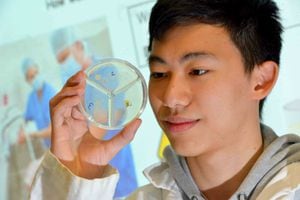
"It is an opportunity for us to show them what real science is about, using Bunsen burners and things like that."
Helping Mr Brown teach the Longnor pupils is Concord sixth former Adebola Osumloki.
The 17-year-old, who lives in Nigeria, hopes to become a doctor when she completes her education, and says she enjoys working with the primary school children.
"I gain a lot from assisting Mr Brown, I know how to interact with the Longnor pupils better," she says.
Mr Brown says the Longnor pupils are taking part in a five-week project, which will see them develop problem-solving skills as they see how science affects the world around them.
He says principal Neil Hawkins wanted to work with primary schools in the area so they too could benefit from the new facilities, which include 22 laboratories, four classrooms and two preparation labs.
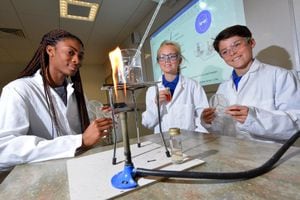
"Neil wanted to see this place serving the community, and making a difference," he says.
"We need more doctors and scientists, and we are helping to produce them."
He says Concord hopes to extend the scheme to other primary schools in the area in the coming months.
Mr Hawkins says the activities are also beneficial to the Concord pupils.
"Our own young people also benefit from having young children coming into the school," he says, adding that it helps them develop communication skills.
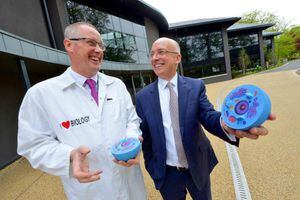
He is also very proud of a 360-degree "sphere", where pupils will be able to be fully surrounded by three-dimensional imagery. This could be used for the teaching of astronomy, for example, where the galaxy can be projected around pupils, or biology, where they will get the chance to experience being at the bottom of the ocean.
Concord was last year ranked as the second best school in the country for science, coming ahead of famous public schools such as Eton and Fettes.
Mr Brown says the school is keen to develop inquiring minds which recognises that science is an evolving concept which still includes many unknowns.
"It is important for us to stretch the students, and I think it is also important for them to see that we don't have all the answers."

